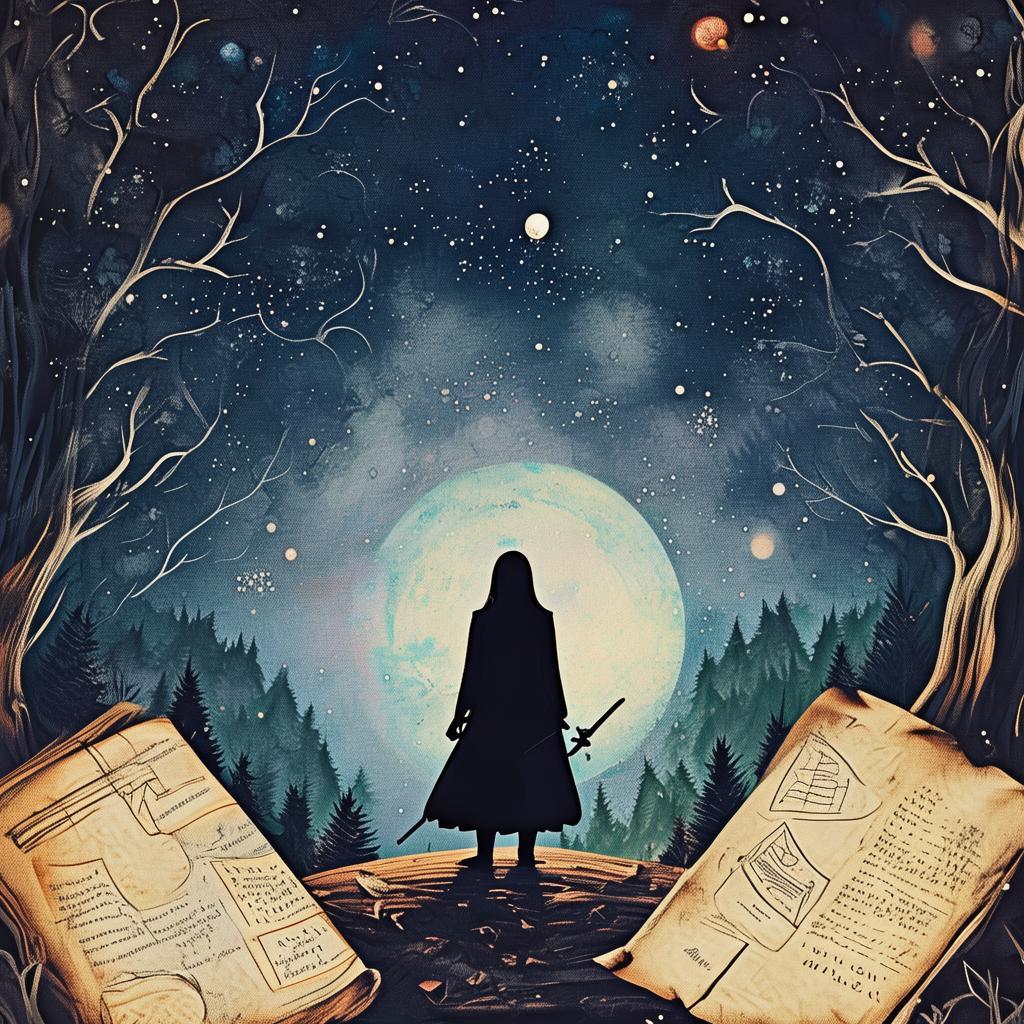Resonance of the Riffs: A Symphony of Redemption
In the shadow of the legendary rock band Metallica's album "The Metallica Requiem," a young girl named Elara found herself lost in the depths of her own imagination. She was an avid fan, her bedroom adorned with posters, vinyl records, and a mini-fridge filled with the band's merchandise. One fateful night, as she lay on her bed, listening to "The Call of Ktulu," the melody seemed to transcend the speakers, wrapping around her like a siren's song.
Suddenly, the room was bathed in an eerie light, and Elara found herself standing in a desolate landscape, the ground beneath her feet a patchwork of black and white tiles, reminiscent of the cover of the album. She was surrounded by towering statues of musicians, their faces twisted in expressions of agony and triumph. She turned to see a figure approaching, cloaked in a long, flowing robe, the hood casting a shadow over their eyes.
"Welcome, Elara," the figure said, their voice echoing like the distant rumble of thunder. "You have been chosen to enter the world of The Metallica Requiem, a world where music is magic, and the fate of all is intertwined with the notes you play."
Elara's heart raced. She had always been drawn to the power of music, to the way it could heal and transform. But this was different. This was a world where music was more than just entertainment; it was a force that could shape destinies.

The figure extended a hand, and Elara felt a surge of energy course through her veins. In an instant, she was no longer in her room. She was in the world of The Metallica Requiem, surrounded by fantastical creatures and landscapes that seemed to pulse with the rhythm of the music.
She met her guide, a figure known as The Riffmaster, who wore a crown of broken guitar strings and held a staff that ended in a tuning fork. "You must learn to wield the power of music," The Riffmaster said. "The world of The Metallica Requiem is at a crossroads. The balance between good and evil is delicate, and only your melodies can restore harmony."
Elara's journey began with a series of trials, each designed to test her musical abilities and her will to fight for what is right. She faced off against the dark forces of the Dystopian Symphony, a group of musicians who had succumbed to the darkness of their own despair, using their music to spread chaos and despair.
The first trial was a confrontation with a figure known as The Melancholy Maestro, a former hero who had fallen to the darkness. "You cannot defeat me with mere notes," The Melancholy Maestro sneered. "Music is not just about rhythm and harmony; it is about the soul."
Elara stood her ground, her eyes fixed on the Maestro's face, which was twisted in a grotesque parody of a human. "Music is the voice of the soul," she replied, her voice steady and clear. "And the soul can be saved, even if it has been lost."
With a newfound determination, Elara began to play. Her fingers danced across the air, and the notes she produced were like a beacon of light, piercing through the darkness. The Melancholy Maestro's form began to waver, and with a final, despairing note, he dissolved into nothingness.
As Elara's confidence grew, so did her powers. She learned to summon storms with the power of her voice, to heal wounds with gentle melodies, and to inspire courage in the hearts of those who had lost hope. But her journey was far from over.
The final trial was the most daunting of all. It was a confrontation with The Shadow King, the leader of the Dystopian Symphony, who had been corrupted by the pure darkness that lay at the heart of the world. "You will never be able to stop me," The Shadow King hissed. "Music is my weapon, and I will use it to enslave all."
Elara felt the weight of the world upon her shoulders. She knew that this was the moment of truth, the moment when she would either succeed or fail. She took a deep breath, and then began to play. The notes she produced were unlike anything she had ever played before, a blend of the most beautiful and the most terrifying music she could imagine.
The Shadow King's form began to shudder, and the darkness that surrounded him started to fade. Elara continued to play, her music a force of light that pushed back the darkness. With a final, powerful chord, The Shadow King was banished, and the world of The Metallica Requiem was saved.
Elara found herself back in her room, the music of "The Call of Ktulu" still playing softly in the background. She realized that her journey had not been just a fantasy; it had been a test of her resolve, her courage, and her love for music. She had faced her fears and had emerged stronger, ready to face the world with a newfound sense of purpose.
As she lay in bed, she whispered to herself, "Music is the voice of the soul, and the soul can be saved, even if it has been lost." She smiled, knowing that she had not only saved the world of The Metallica Requiem but had also saved a part of herself.
✨ Original Statement ✨
All articles published on this website (including but not limited to text, images, videos, and other content) are original or authorized for reposting and are protected by relevant laws. Without the explicit written permission of this website, no individual or organization may copy, modify, repost, or use the content for commercial purposes.
If you need to quote or cooperate, please contact this site for authorization. We reserve the right to pursue legal responsibility for any unauthorized use.
Hereby declared.









